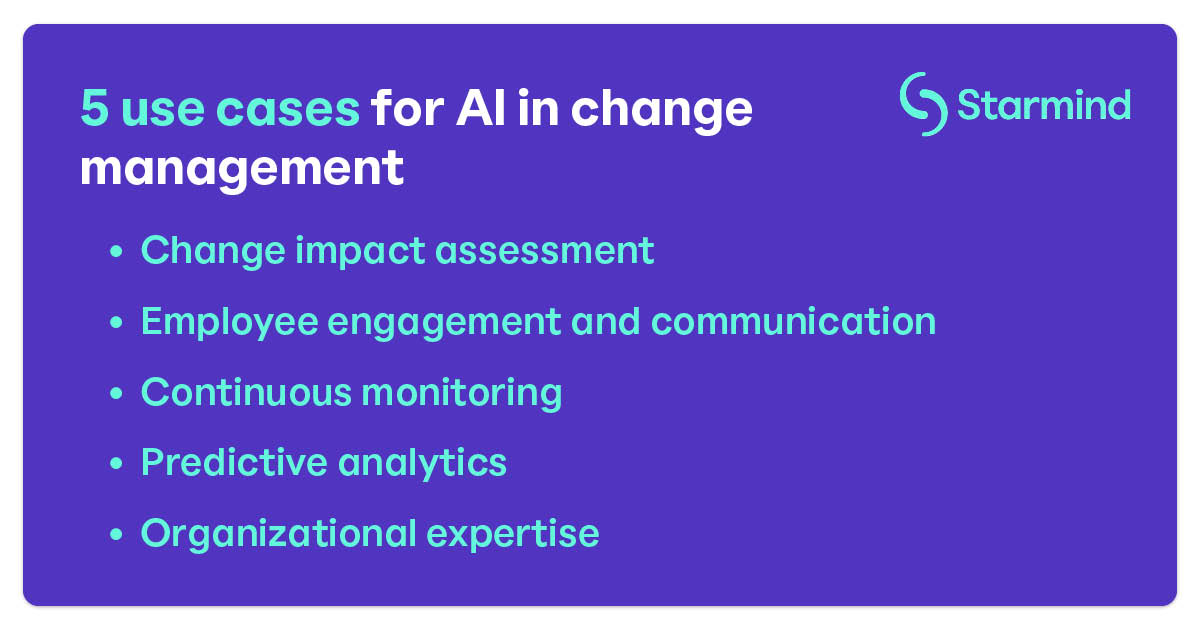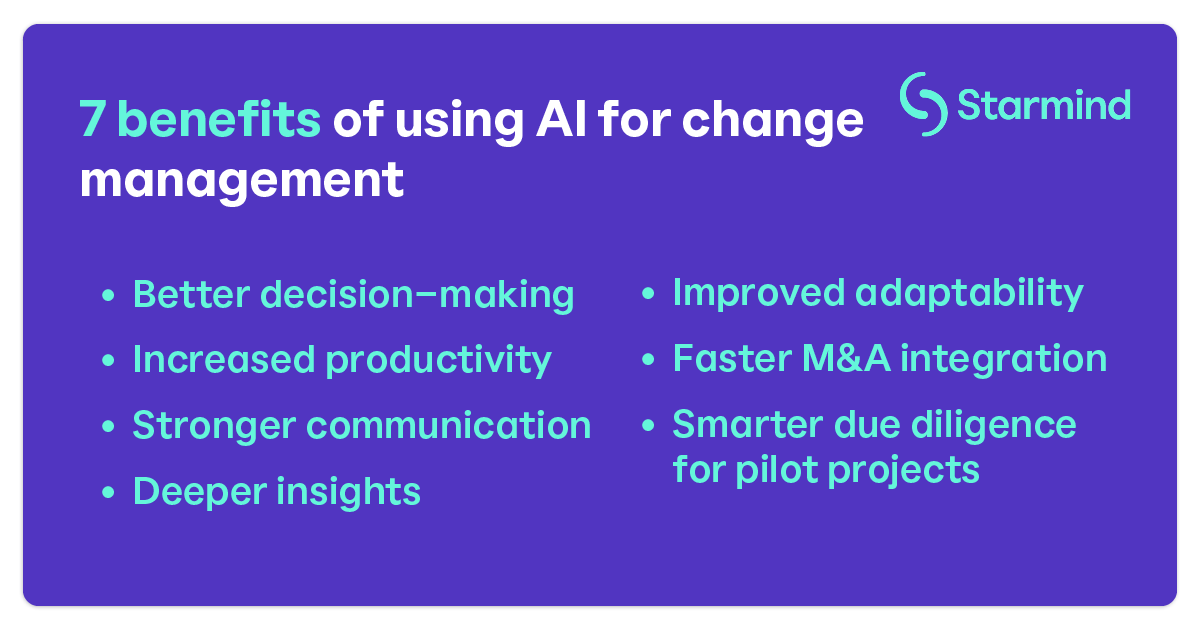AI for change management in the enterprise

Contents
Communicating change, winning buy-in and executing transformation at scale remains exceedingly difficult and resource-intensive.
According to research from Gartner, the willingness of employees to support organizational change has significantly declined over the years. In 2016, 74% of employees were open to organizational change, but by 2022, only 38% agreed. When employees get tired of change, they’re more likely to leave, Gartner found, with only 43% of people experiencing above-average change fatigue likely to stay put.
Learn more about common challenges of change management, AI use cases that make change management easier, and how Starmind can help your organization adapt to change faster by giving teams instant access to reliable knowledge in one central place using enterprise-grade AI.
Common challenges with change management in the enterprise
Leading transformational change in the enterprise can be a complex and daunting task. It requires careful planning, coordination, and execution to ensure that initiatives are successful, and any number of obstacles can slow you down.
Organizational Resistance to Change
Organizational resistance is one of the biggest obstacles to successful change management in the enterprise. Employees may be resistant to change due to fear of failure or loss of control over their work environment. This resistance can manifest itself in various ways, such as denial or procrastination. For a successful transition into new systems or processes, it is important for organizations to understand why employees might resist change and take steps to address those issues before implementation begins.
Lack of Resources
Another key challenge with enterprise-level business transformation is a lack of adequate resources and budget allocated towards the initiative. Organizations often underestimate the true cost associated with implementing new systems or processes, which can lead to delays or even failure.
Difficulty Measuring Impact
The odds of long-term success in business transformation projects greatly improve if reliable data is available to evaluate different scenarios before making any major decisions.
Poor Communication
Transparency and clear communication are critical during change management processes, as confusion can easily arise during complex business transformation projects. Without good communication, change efforts can struggle, stall or even fail. Without transparency, teams won’t know what they should be doing — or doing differently — and employees could duplicate or even work against their colleagues’ efforts.

Use cases for AI in change management
AI-powered tools can help organizations reduce disruption, maximize efficiency and stay competitive in a rapidly changing market environment.
Impact assessment and scenario planning
Predictive analytics uses historical and real-time data to identify patterns and project likely future outcomes. These insights can help change leaders anticipate and mitigate resistance or roadblocks, as well as devise strategies that are more likely to be successful the first time around.
An AI-powered change impact assessment simulates and predicts likely scenarios, helping companies understand the potential effects of a change initiative. By leveraging AI algorithms and advanced analytics, decision-makers get a more comprehensive view of how various factors might influence change outcomes. This allows them to proactively identify risks, opportunities and potential challenges.
Employee engagement and communication
Effective communication is essential to change management, and AI tools can offer real-time, 24/7 support and guidance to employees. Chatbots and virtual assistants, for example, can help employees self-resolve queries, while AI-powered tools like Starmind can help people find internal experts to address complex issues, add context and verify information.
AI algorithms can also analyze employee sentiment and feedback, enabling organizations to tailor communication strategies. This level of customization improves accessibility and makes communication more engaging, increasing the likelihood of stakeholders embracing the change.
Resistance analysis and mitigation
Understanding employee sentiment isn’t just beneficial for internal communication. AI can help change leaders detect, measure and analyze stakeholder resistance to change by processing and interpreting large volumes of textual and sentiment data.
For example, AI algorithms can identify and categorize patterns in employee concerns or resistance by leveraging natural language processing (NLP) and sentiment analysis. This AI-driven approach allows change managers to pinpoint the root causes of resistance and address them with tailored interventions.
Continuous monitoring of business impact
AI-powered continuous monitoring systems enable organizations to collect and analyze real-time data related to change initiatives, helping decision-makers understand what’s working and where the change is taking hold. These tools can also identify areas requiring attention, allowing organizations to make timely adjustments.
Expertise sharing
Technical, dispersed and siloed teams are just some of the employee groups who need quick access to accurate, up-to-date information during transformation projects. AI-powered tools such as Starmind's real-time expertise directory help employees quickly access reliable information on previous projects to avoid duplication of work. With a simple query, employees can locate information and connect with relevant subject matter experts in the organization to provide knowledge or verify information. This time-saving process accelerates transformation, ensures alignment and catalogs the information for future use.
7 benefits of using AI for change management
AI can be a powerful multiplier for change management efforts, especially when integrated within existing tools and processes. Let’s review some of the key benefits of AI-enabled transformation.
Better decision-making
Traditional decision-making processes rely on human intuition and experience, which are valuable but limited by biases and incomplete information. AI tools, however, can process more data from more sources — and faster — than any human. By collecting and analyzing historical data, real-time feeds and external data sources, these tools can provide a holistic and more objective view.
This real-time, accurate perspective is especially important during fast-moving, complex change scenarios, where leaders need to understand what’s going on and whether they need to intervene.
However, AI has limitations, and it won’t always have the best (or right) answers. The key is to combine AI’s efficiency with human expertise.
Increased productivity
Many change management tasks are time-consuming and require manual effort, including data entry, data analysis, documentation and reporting. AI technologies can help organizations automate these tasks, improving speed and accuracy while freeing employees up for more strategic work. With fewer mistakes from manual labor, you reduce duplicate work and the risk of errors that can delay, diminish or derail change management processes.
Stronger communication
AI-powered chatbots, expertise directories and virtual assistants act as interactive communication channels, providing employees with instant access to information and resources. They can answer frequently asked questions, provide updates on the progress of the change initiatives and offer guidance on how to navigate the changes.
These tools also promote collaboration within the organization by helping break down data silos. They can connect employees with relevant stakeholders, teams or subject matter experts. AI tools can also recommend collaboration based on employee roles, skills and needs, contributing to a culture of teamwork and knowledge sharing.
Deeper insights
AI-powered analytics can uncover patterns and correlations within data that may not be apparent to human analysts. AI tools can also perform this work faster and on a bigger scale than humans. This deeper understanding of data can lead to better predictions, more informed risk assessments and improved decision-making throughout the change management process.
For example, AI analysis of customer behavior, preferences and feedback allows businesses to better understand customer motivations and preferences. If your change management initiative involves new product lines or a change in marketing, these AI-driven insights can be a powerful influence, increasing the odds of success and saving time and money.
Improved adaptability
In today’s accelerating business environment, you must adapt quickly to changing circumstances. But to do this, you need a real-time view of business conditions and insights generated on the latest and most relevant information. AI tools help create these conditions so leaders can make agile decisions with confidence.
For example, if a change initiative isn't yielding results or faces unusual resistance, AI can identify potential bottlenecks and provide recommendations. This real-time feedback and guidance helps organizations pivot quickly.
Faster M&A integration
Mergers and acquisitions (M&A) don’t end when the deal is signed. Organizations must then integrate teams, processes and cultures. This integration process can be complex and time-consuming, delaying the realization of value from the deal. However, AI-powered solutions can help by consolidating key information and making it easy for all employees to access, regardless of which organization they came from or how their job roles are shifting.
AI-powered platforms provide a hub where employees can ask questions, seek advice and share best practices. This fosters a culture of collaboration where employees can find the expertise they need in the moment. This speeds up integration both on a technical level and in bringing the cultures together.
Smarter due diligence for pilot projects
Conducting due diligence for pilot projects can take time, as multiple ideas are in play, yet the knowledge leaders need might be unavailable or difficult to locate. Furthermore, teams might not know which ideas have been already tried elsewhere in the organization.
AI-powered tools can analyze historical project outcomes, resources and trends that can expedite the evaluation phase. For example, Roche needed a way to connect its global team of more than 100,000 employees to internal expertise. Because the company is so large, initiatives across the global workforce became fractured and disconnected. After partnering with Starmind, the company quickly developed an AI pilot program for 1,000 employees.
Early efforts were a massive success, and the company was able to leverage AI to improve communication and collaboration, as well as analyze the success of the program. Within the first year, Roche doubled its user base to 2,000, and it did so again in 2022, to 4,000. In 2023, the user count doubled yet again, to nearly 9,000.
Transforming your business with AI for change management
Adapting to change is rarely easy. That’s why companies are using AI for change management to increase speed, effectiveness and employee buy-in. AI-powered tools can expand the possibilities of change management while helping businesses maximize their existing expertise and resources.
Starmind’s AI-powered, real-time, organization-wide expertise directory helps businesses accelerate performance, increase sales and improve collaboration. It offers the benefits of AI with less risk by protecting your IP and adding a verification layer to AI-generated results.
Interested in learning how Starmind can help boost your change management process and set your team up for long-term success? Get in touch with us to learn how you can bring all of your company’s knowledge into one central platform.
Sign up to receive latest stats, insights and events
3 ways CPG companies can use AI to overcome the biggest R&D challenges [NEW GUIDE]
AI is transforming the CPG industry. Get ahead of your competitors. Learn about:
- Streamline product development, connect experts, reduce errors, learn in real time.
- Innovate globally with seamless marketing, research, and supply chain connections.
- Eliminate duplication of efforts, connect researchers with in-house expertise and insights.
Download your guide today!
Related posts
My rich text default content

My rich text default content

Left side rich text
Right side rich text
Pillar section rich text



